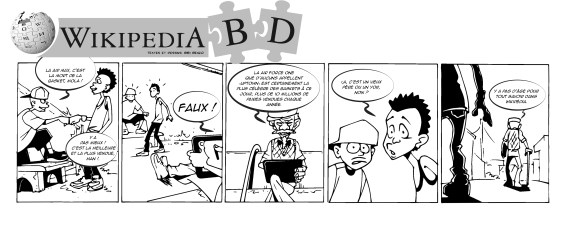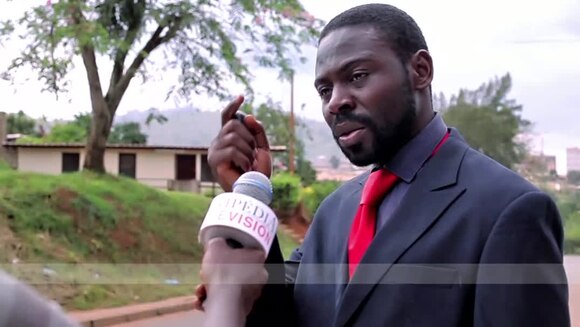The first-ever television spots for Wikipedia aired in mid-2014 in Cameroon, as part of a campaign designed to raise awareness of Wikipedia in this western African country — where the use and awareness of Wikipedia has been historically low.
Iolanda Pensa, researcher at SUPSI and former scientific director for WikiAfrica, produced this awareness campaign along with Mike Epacka and others at doual’art, a non profit cultural organization based in Douala, Cameroon.
“The starting point of any kind of possible participation [in Wikipedia] is that you need to know that it exists, you need to find it useful and relevant, and you need to know that something is missing,” says Pensa. “This is the typical way people start contributing because people think there are better ways to improve it.”
The idea of producing a video came about in 2010 when Pensa sat down with Epacka, who works as a creative professional in Cameroon, to talk about the challenges faced by Wikipedia in this region.
In September 2013, Pensa applied on behalf of the team for an individual engagement grant from the Wikimedia Foundation; she received approval for a grant in January 2014. The concept, script and all of the production took place locally in Cameroon. Pensa got to work right away, along with Epaka, videographer Regis Talla, artists Bibi Benzo — and members of doual’art including Didier Schaub, Marilyn Douala Bell and Victor Njehoya. Their first challenge was to approach the Cameroonian audience in such a way that Wikipedia would not be “[…] sold as something that will save the world – we didn’t want that.”
The premise for the spots was simple:
-
- Someone is asked to define Wikipedia.
- The person responds with an inaccurate guess.
- The person is corrected.
Pensa told us that the team aimed for the script to be easy to imitate, so that the same idea could be adapted in other countries that also have low Wikipedia participation.
“We were doing three things at once: we were producing for the people of Cameroon, we were talking to an international audience and we were producing something that is easily reproducible.” says Pensa.
In addition to the two television spots, the campaign included a series of comics that were placed in the major national newspaper of Cameroon.
Soon after the videos were produced, they were shown at WikiIdaba and at Wikimania 2014 in London, where they were received favorably.
The airtime for the television campaign was funded by Orange Cameroon (with whom the Wikimedia Foundation has a Wikipedia Zero partnership).
The campaign and grant report was finalized in October 2014.
The full impact of the campaign is not yet known. Overall desktop and mobile traffic for Wikipedia in Cameroon has increased since the campaign began, though the data has not yet been analyzed (see image here).
Pensa views this project as a success and hopes that African chapters of Wikimedia will submit their own individual engagement grant applications to make their own videos in the same way. “It would be great to have new communication projects and videos in Tunisia and South Africa” says Pensa.
She is optimistic about the future of participation in Wikipedia in Cameroon, “People like to edit because they also have fun: we don’t do it because we have the mission of writing an encyclopedia, we do it because it’s fun.”
Blog post by Victor Grigas, Storyteller, Wikimedia FoundationInterview by Yoona Ha, Communications intern, Wikimedia Foundation

Wikipedia BD: A french comic that was placed in newspapers in Cameroon. More here. Comic strip by Biba Jacques Claver, CC BY-SA 3.0.

Can you help us translate this article?
In order for this article to reach as many people as possible we would like your help. Can you translate this article to get the message out?
Start translation


